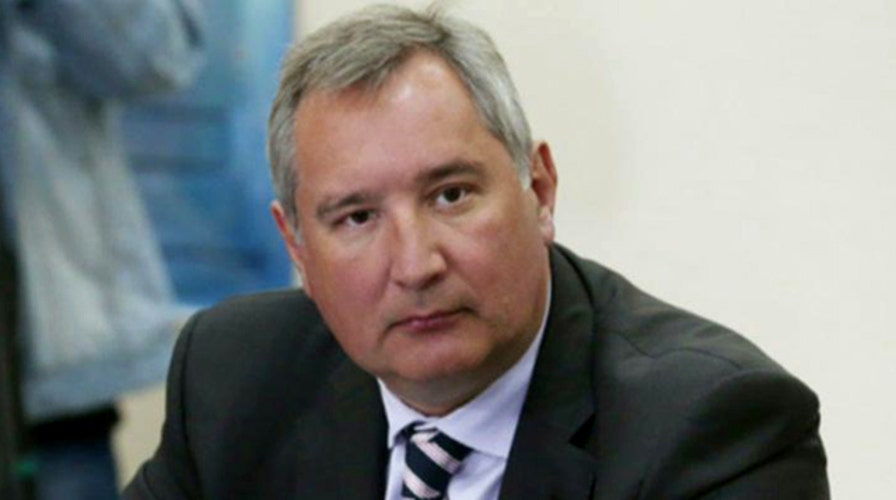Russian official benefits from DOD deal despite sanctions
James Rosen reports from Washington, D.C.
A top Russian official sanctioned by President Obama in the wake of the Ukraine crisis is playing a key role in the Pentagon's space program, and thereby continuing to benefit from a lucrative no-bid contract that the Department of Defense awarded earlier this year, Fox News has confirmed.
Dmitry Rogozin, deputy prime minister of the Russian Federation, was among the senior Kremlin officials targeted by the White House's sanctions announcement of March 17. Included in Rogozin's broad portfolio of duties, by virtue of a special order from Russian President Vladimir Putin issued two years ago, is oversight of the Russian space sector, in which capacity Rogozin supplies sophisticated hardware used in the Pentagon's launches of satellites into space.
This past January, the U.S. Air Force awarded a "blockbuster" sole-source contract to a private-sector firm called United Launch Alliance (ULA), a joint venture of Lockheed Martin and Boeing, for the purchase of 36 of the rockets, or "booster cores," that the Pentagon uses in its Delta IV and Atlas V space-launch systems. The contract was the most recent in a series that the Air Force has recently finalized with ULA, collectively valued at $2.5 billion.
ULA, however, does not manufacture the engines used in the Atlas V system; for that, the Boeing-Lockheed consortium turns to NPO Energomash, a majority Kremlin-owned company directly overseen by Rogozin. Energomash's engines, specifically the RD-180 model, are fueled by kerosene and liquid oxygen, and fetch an estimated $15 to $20 million apiece.
"Even though Rogozin is on the sanction list," a source with ties to the aerospace industry told Fox News in an email, "the U.S. continues to engage his space empire for Russian engines to put highly sensitive Pentagon satellites in space."
Rogozin was one of 11 senior Russian officials named in President Obama's first round of Ukraine-related sanctions. Last year the longtime Putin ally, a former Russian ambassador to NATO, announced an ambitious plan to consolidate Russia's sprawling and under-performing space sector into a single state-controlled corporation.
Mark Jacobson, a senior fellow at the German Marshall Fund and former NATO official, agreed that the Pentagon's contracting process for its space launches is "a problem over the medium to long term" for U.S. national security.
"The United States is going to have to find a way to diversify its ability to put heavy payloads into space," he told Fox News.
"The single point of failure in this case is that we assume that the Russians will always provide these engines. What happens if they stop?"
Washington's use of sanctions, Jacobson argued, is not only potentially undermined by the Pentagon's continued steerage of business to the Rogozin empire, but in fact may serve to accelerate American dependence on the sanctioned official.
"There's an impetus for ULA to go out and purchase as many Russian engines as possible before future sanctions go into place," said Jacobson, formerly a senior adviser in Afghanistan to Generals David Petraeus and Stanley McChrystal. "This may not be in the best interests of U.S. diplomacy. ... Industry is not necessarily aligned with where the United States needs to go on Russia."
In a statement provided to Fox News, ULA spokesperson Jessica Rye rejected the notion that the firm's use of Russian engines leaves the U.S. too reliant on Moscow for Pentagon space launches.
"ULA maintains a two-to-three-year year supply of RD-180 engines in the United States to minimize potential supply disruptions," Rye said. "Russia has taken no actions to restrict sales or exports of the RD-180 ... [and] the RD-180 supply chain has never experienced a supply disruption in the fifteen years of imports."
Rye added that if the current strain in relations with Russia over the Ukraine crisis ever interfered with the United States' use of the Atlas V launch system, "critical national security payloads could be transferred to ULA's Delta IV Evolved Expendable Launch Vehicle (EELV) family of launch vehicles."
Asked whether the continued import of the RD-180 was effectively undermining the sanction imposed on Rogozin, State Department spokesperson Jen Psaki noted that the deputy prime minister had been targeted "as an individual, not as a company," and cited the "range of authorities" and "flexibility" the U.S. has to amend the sanctions, if necessary.
A leading aerospace company announced Friday it is challenging in the U.S. Court of Federal Claims the Air Force's contract with ULA. Elon Musk, chief executive officer of SpaceX, the firm that launches satellites for NASA and commercial ventures without the Russian engines, cited both the sole-source nature of the January contract and the recent inclusion of Rogovin on the White House sanctions list.
"It's hard to imagine some way that Dmitry Rogozin is not benefiting personally from the dollars that are being sent there," Musk said at a Washington news conference. "This seems like the wrong time to be sending hundreds of millions of dollars to the Kremlin."





